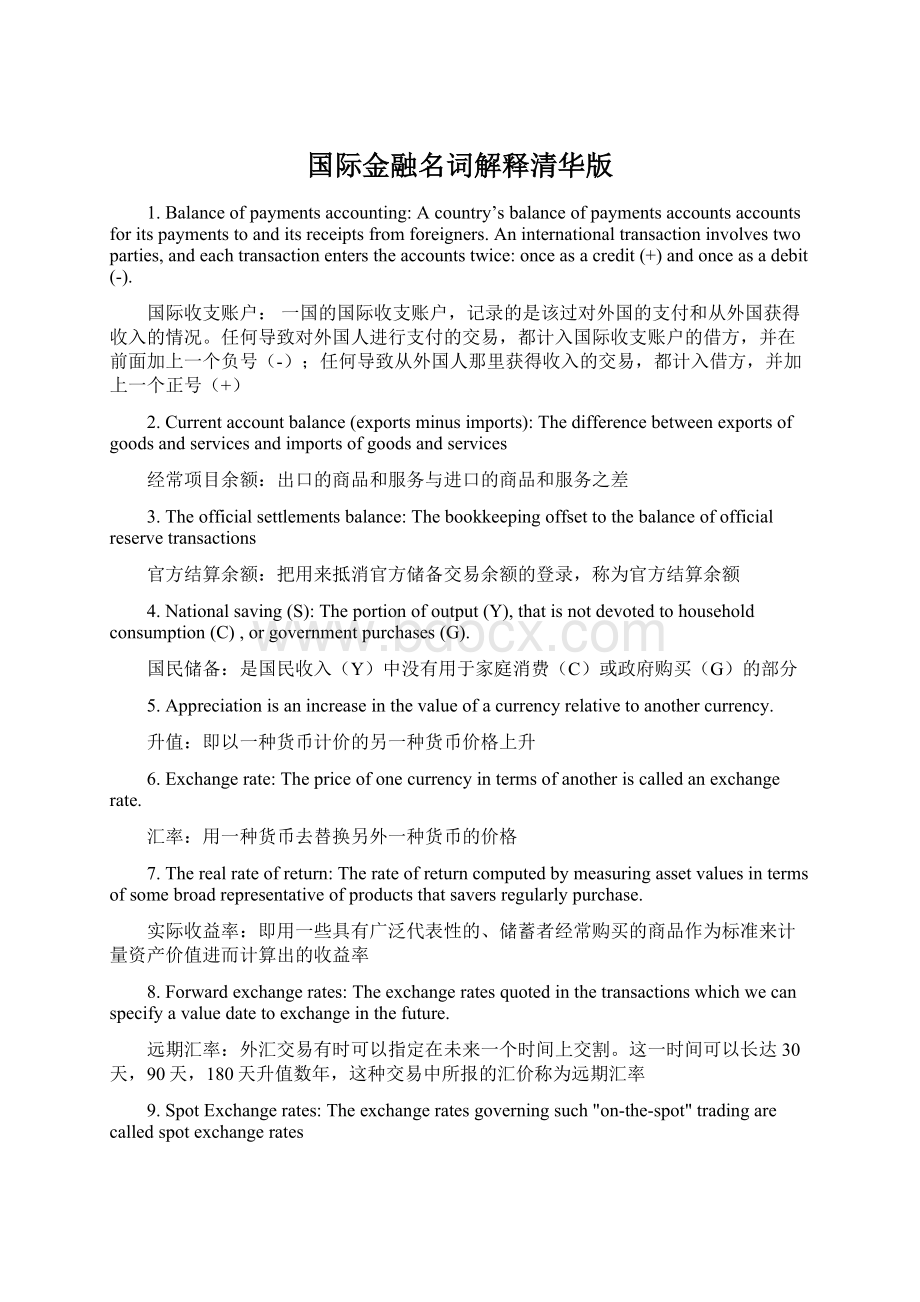国际金融名词解释清华版.docx
《国际金融名词解释清华版.docx》由会员分享,可在线阅读,更多相关《国际金融名词解释清华版.docx(6页珍藏版)》请在冰豆网上搜索。

国际金融名词解释清华版
1.Balanceofpaymentsaccounting:
Acountry’sbalanceofpaymentsaccountsaccountsforitspaymentstoanditsreceiptsfromforeigners.Aninternationaltransactioninvolvestwoparties,andeachtransactionenterstheaccountstwice:
onceasacredit(+)andonceasadebit(-).
国际收支账户:
一国的国际收支账户,记录的是该过对外国的支付和从外国获得收入的情况。
任何导致对外国人进行支付的交易,都计入国际收支账户的借方,并在前面加上一个负号(-);任何导致从外国人那里获得收入的交易,都计入借方,并加上一个正号(+)
2.Currentaccountbalance(exportsminusimports):
Thedifferencebetweenexportsofgoodsandservicesandimportsofgoodsandservices
经常项目余额:
出口的商品和服务与进口的商品和服务之差
3.Theofficialsettlementsbalance:
Thebookkeepingoffsettothebalanceofofficialreservetransactions
官方结算余额:
把用来抵消官方储备交易余额的登录,称为官方结算余额
4.Nationalsaving(S):
Theportionofoutput(Y),thatisnotdevotedtohouseholdconsumption(C),orgovernmentpurchases(G).
国民储备:
是国民收入(Y)中没有用于家庭消费(C)或政府购买(G)的部分
5.Appreciationisanincreaseinthevalueofacurrencyrelativetoanothercurrency.
升值:
即以一种货币计价的另一种货币价格上升
6.Exchangerate:
Thepriceofonecurrencyintermsofanotheriscalledanexchangerate.
汇率:
用一种货币去替换另外一种货币的价格
7.Therealrateofreturn:
Therateofreturncomputedbymeasuringassetvaluesintermsofsomebroadrepresentativeofproductsthatsaversregularlypurchase.
实际收益率:
即用一些具有广泛代表性的、储蓄者经常购买的商品作为标准来计量资产价值进而计算出的收益率
8.Forwardexchangerates:
Theexchangeratesquotedinthetransactionswhichwecanspecifyavaluedatetoexchangeinthefuture.
远期汇率:
外汇交易有时可以指定在未来一个时间上交割。
这一时间可以长达30天,90天,180天升值数年,这种交易中所报的汇价称为远期汇率
9.SpotExchangerates:
Theexchangeratesgoverningsuch"on-the-spot"tradingarecalledspotexchangerates
即期汇率:
我们前面所讨论的外汇交易都是即期的:
交易双方同意交换英航存款,并立即交割,这种即期交易的汇率被称为即期汇率,这是发生的交易被称为即期交易
10.Interestparitycondition:
Theconditionthattheexpectedreturnsondepositsofanytwocurrenciesareequalwhenmeasuredinthesamecurrencyiscalledtheinterestparitycondition.
利率平价条件:
用相同货币衡量的任意两种货币存款的预期收益率相等的条件
11.Vehiclecurrency:
Becauseofitspivotalroleinsomanyforeignexchangedeals,thedollarissometimescalledavehiclecurrency.
载体货币:
因为美元在如此众多的外汇交易中发挥着中枢的作用,美元优势也被称为载体货币
12.Aggregatemoneydemand:
aggregatemoneydemandisthetotaldemandformoneybyallhouseholdsandfirmsintheeconomy.isjustthesumofalltheeconomy’sindividualmoneydemands.
货币总需求:
至经济中所有家庭和企业对货币总的需求,及经济中所有的个人货币需求之和.
13.Moneysupply:
thetotalamountofcurrencyandcheckingdepositsheldbyhouseholdandfirms.
货币供给:
是指联邦储备系统所称的货币总量,即M1,包括家庭和企业持有的现金和支票存款总额
14.Exchangerateovershooting:
theexchangerateissaidtoovershootwhenitsimmediateresponsetoadisturbanceisgreaterthanitslong-runresponse.
汇率超调:
当汇率对于货币波动的即刻反应超过的额长期反应时,我们称之为货币超调
15.Fishereffect:
Thelong-runrelationshipbetweeninflationandinterestrates,ariseinacountry’sexpectedinflationratewilleventuallycauseanequalriseintheinterestratethatdepositsofitscurrencyoffer.Similarly,afallintheexpectedinflationratewilleventuallycauseafallintheinterestrate.
费雪效应:
在其他条件不变的情况下,若一国预期的同伙膨胀率上升,最终会导致该国货币存款利率的同比例上升。
同样,预期同伙膨胀率降低最终会导致利率水平的下降
16.Lawofoneprice:
Thelowofonepricestatesthatincompetitivemarketsfreeoftransportationcostsandofficialbarrierstotrade(suchastariffs),identicalgoodssoldindifferentcountriesmustsellforthesamepricewhentheirpricesareexpressedintermsofthesamecurrency.
一价定律:
在没有运输费用和官方贸易壁垒(例如关税)的自由竞争市场上,同样的货物在不同国家出售,按同一货币计量的价格应该是一样的
17.Nominalinterestrate:
whenwewishtodifferentiatearealexchangerate,whichistherelativepriceoftwooutputbaskets,fromarelativepriceoftwocurrencies,wewillrefertothelatterasanominalexchangerate.名义利率:
两种货币的相对价格
18.Purchasingpowerparity(PPP):
thetheoryofpurchasingpowerparitystatesthattheexchangeratebetweentwocountries’currenciesequalstheratioofthecountries’pricelevels.
购买力平价理论:
两国货币的汇率等于两国价格水平之比。
19.Realexchangerate:
therealexchangeratebetweentwocountries’currenciesisabroadsummarymeasureofthepricesofonecountry’sgoodsandservicesrelativetotheother’s.
实际汇率:
两国货币之间的实际利率是已过商品和劳务价格相对于另一国商品的劳务价格的一个概括性度量标准
20.RelativePPP:
statesthatthepercentagechangeintheexchangeratebetweentwocurrenciesoveranyperiodequalsthedifferencebetweenthepercentagechangesinnationalpricelevels.
相对购买力平价:
在任何一点时间内,两种货币汇率变化的百分比将等于同一时期两国国内价格水平变化的百分比之差
21.AAschedule:
ThescheduleofexchangerateandoutputcombinationsthatareconsistentwithequilibriuminthedomesticmoneymarketandtheforeignexchangemarketiscalledtheAAschedule.
AA曲线:
国内货币市场和外汇市场的均衡条件下的汇率和产出水平的组合成为AA曲线。
22.Inflationbias:
Referstothedifferencebetweenthemeanvalueandthetargetvalueofinflationaccordingtothecirculationbythebasicmodel.
通货膨胀偏向:
指根据基本模型的循环得出的平均价值和目标价值之间通货膨胀的区别。
23.Aggregatedemand:
Theamountofacountry’sgoodsandservicesdemandedbyhouseholdsandfirmsthroughouttheworld.
总需求:
世界范围内的家庭和产商对一个国家的商品和劳务的需求总和。
24.J-curve:
Ifthecurrentaccountinitiallyworsensafteradepreciation,itstimepathhasaninitialsegmentreminiscentofaJandthereforeiscalledtheJ-curve.
J曲线:
如果货币贬值后经常项目最初出现恶化,但随着时间的发展逐步改善,其路径曲线的最初部分就会类似英文字母“J”,我们将其称为J曲线。
25.DDschedule:
Thecurveshowsallcombinationsofoutputandtheexchangerateforwhichtheoutputmarketisinshortrunequilibrium.
DD曲线:
DD曲线显示在资产市场所有产出和汇率的组合在短期均衡。
26.Pass-through:
Thepercentagefromtheexchangeratetoimportpricesbywhichimportpricesrisewhenthehomecurrencydepreciatesby1percent.
转嫁:
当本币贬值1%时,进口产品的价格上涨的百分比被称为从汇率到进口价格的转嫁。
27.Balanceofpaymentscrisis:
Whenacentralbankdoesnothaveenoughofficialinternationalreserveassetstomaintainafixedexchangerate,abalanceofpaymentscrisisresults.
国际收支危机:
当中央银行没有足够的官方国际储备资产来维持固定汇率,其结果为国际收支危机。
28.Bimetallicstandard:
thevalueofcurrencyisbasedonbothsilverandgold.
复本位制:
货币同时以金和银为基础。
29.Capitalflight:
Thereservelossaccompanyingadevaluationscare
(Financialcapitalisquicklymovedfromdomesticassetstoforeignassets)
资本抽逃:
基于贬值恐慌的储备流失
30.Devaluation:
Adevaluationoccurswhenthecentralbankraisesthedomesticcurrencypriceofforeigncurrency.
本币币值下调:
当中央银行提高了外币的本币价格E时,就称为本币币值下调。
31.Goldexchangestandard:
halfwaybetweenthegoldstandardandapurereservecurrencystandardisthegoldexchangestandard
金汇兑本位制:
介于金本位和纯粹的储备货币标准之间的是金汇兑本位制。
32.Goldstandard:
goldactsasofficialinternationalreservesthatallcountriesusetomakeofficialinternationalpayments.
金本位制:
黄金充当官方国际储备,所有国家官方用其来完成国际收支。
33.Imperfectassetsubstitutability:
Ingeneral,foreignanddomesticassetsmaydifferintheamountofriskthattheycarry:
theymaybeimperfectsubstitutes.
资产的不完全替代:
一般来说,外国和国内资产可能自身所附带的风险不同:
他们不能完成完全的资产置换
34.Managedfloatingexchangerates:
systeminwhichgovernmentsmayattempttomoderateexchangeratemovementswithoutkeepingexchangeratesrigidlyfixed.
有管理的浮动汇率:
政府可能会试图缓和汇率的波动但并不会使汇率完全固定的体系
35.Perfectassetsubstitutability:
thekeyfeatureofourmodelthatleadstotheseresultsistheassumptionthattheforeignexchangemarketisinequilibriumonlywhentheexpectedreturnsondomesticandforeigncurrencybondsarethesame.
资产的完全替代:
只有当本币债券与外币债券的预期收益一样时,外汇市场才会均衡。
36.Reservecurrency:
onecurrencyactsasofficialinternationalreserves.
储备货币:
充当官方国际储备的货币。
37.Revaluation:
arevaluationoccurswhenthecentralbanklowerthedomesticcurrencypriceofforeigncurrency
本币币值上调:
当中央银行降低了外币的本币价格E时,就称为本币币值上调。
38.Riskpremium:
Thedifferencebetweentheriskinessofdomesticandforeignbonds
风险升水:
本币债券与外币债券的风险差异。
39.Self-fulfillingcurrencycrises:
Expectationsofabalanceofpaymentscrisisonlyworsenthecrisisandhastendevaluationthatoccurinsuchcircumstancesoftenarecalledself-fulfillingcurrencycrises.
自我实现的货币危机:
预期的国际收支危机反而加剧了危机和加速贬值,出现在这种情况下通常被称为自我实现的货币危机
40.Sterilizedforeignexchangeintervention:
Centralbankssometimescarryourequalforeignanddomesticassettransactionsinoppositedirectionstonullifytheimpactoftheirforeignexchangeoperationsonthedomesticmoneysupply.thistypeofpolicyiscalledsterilizedforeignexchangeintervention
冲销性外汇干预:
中央银行有时会进行数量相等但方向相反的国外资产和国内资产交易,以抵消外汇交易对国内货币供给的影响。
41.Externalbalance:
Acountry’scurrentaccountisneithersodeeplyindeficitthatthecountrymaybeunabletorepayitsforeigndebtsinthefuturenorsostronglyinsurplusthatforeignersareputinthatposition.
外部平衡:
一国经常账户既没有陷入赤字危机而使得将来无法清偿外债,又没有由于过度的盈余而使他国先入这种境地。
42.Internalbalance:
Thefullemploymentofacountry’sresourcesanddomesticpricelevelstability.
内部平衡:
一国资源的充分利用和国内价格水平的稳定
43.Expenditure-changingpolicy:
Changingsocialneedsortotalexpenditurelevelofthenationaleconomypolicy,whosepurposeistochangeaggregatedemandtochangethedemandforforeigngoods,servicesandfinancialassets,andachievethebalanceofpaymentsadjustment.
支出-变动政策:
不断变化的社会需求或国家经济政策的总开支水平,其目的是改变总需求来改变对外国商品、服务和金融资产的需求,实现国际收支平衡调整
44.Price-specie-flowmechanism:
Undertheinternationallycommonpracticeofthegoldstandard,acountry'sinternationalbalanceofpaymentscankeepequilibriumautomaticallybythefluctuationsofcommoditypriceandtheoutputorinputofgold.
物价-硬币-流动机制:
在金本位制的国际惯例下,一个国家的国际收支平衡可以通过大宗商品价格的波动和输出或输入的黄金自动保持平衡。
45.Expenditure-switchingpolicy:
Thepolicieswhichcanaffecttheinternationalcompetitivenessofcommoditiesandtoincreasetheirincomerelativetospendingbychangingthespendingstructure.
支出-转换政策:
能够影响商品的国际竞争力的政策,而且通过改变支出结构来增加他们的可支配收入。
46.Destabilizingspeculation:
Itmeansthatifforeignexchangetraderssawthatacurrencywasdepreciating,itwasargued,theymightsellthecurrencyintheexpectationoffuturedepreciationregardlessofthecurrency’slonger-termprospects;andasmoretradersjumpedonthebandwagonbysellingthecurrency,theexpectationsofdepreciationwouldberealized.
导致不稳定的投资:
如果国际外汇交易商发现